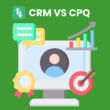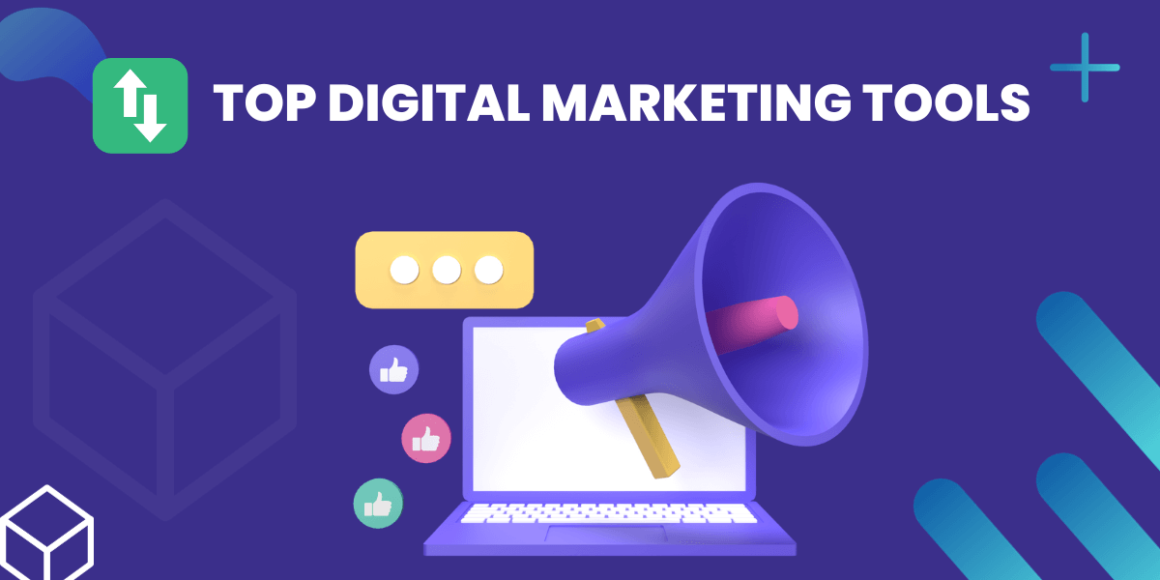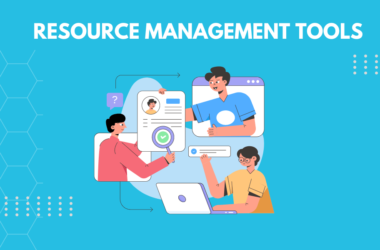Table of Contents Show
Are you looking to enhance your digital marketing strategy? Look no further! In this blog post, we will introduce you to the top 5 digital marketing tools that every marketer should know.
From search engine optimization (SEO) to social media management and analytics, these tools will help you optimize your campaigns and drive better results. So let’s dive in and discover how these tools can take your digital marketing efforts to the next level.
1. Search Engine Optimization (SEO) Tools
Achieve optimal results in your digital marketing efforts by leveraging SEO tools that provide invaluable insights into keyword research, on-page optimization, and backlink analysis. With these essential tools at your disposal, you can refine your SEO strategy to attract more organic traffic to your website while effectively targeting specific audiences across various social media platforms.
Harnessing the power of these robust digital marketing tools is crucial for staying competitive in today’s dynamic online landscape.
a. Keyword Research Tools
When it comes to SEO strategy, keyword research is crucial for optimizing your content and driving organic traffic to your website. Fortunately, there are several digital marketing tools available that can help you in this process.
These tools allow you to identify relevant keywords with high search volumes, analyze keyword competition, and uncover valuable insights for your social media campaigns.
Keyword research tools are essential for optimizing content, driving organic traffic, and gaining valuable insights for social media campaigns. On-page optimization tools help improve website visibility and ranking on search engine result pages (SERPs) by analyzing meta tags, headings, URL structure, and keyword density.
Keyword research tools include:
- Google Keyword Planner
- Keywordtool.io
- Wordstream
- SEMrush
- Ahrefs
b. On-Page Optimization Tools
Enhance your SEO strategy with the right on-page optimization tools. These tools allow you to analyze and optimize various elements of your website, such as meta tags, headings, and keyword usage. By using these tools effectively, you can improve your website’s visibility in search engine results and drive more organic traffic.
On-page optimization tools help improve website visibility and ranking on search engine result pages (SERPs) by analyzing meta information, tags for headings, URL structure, and keyword density.
You can take your on-page optimization to the next level by integrating social media into your strategy. With the right tools, you can optimize your content for social sharing, track engagement metrics, and even schedule posts across multiple platforms. This combination of on-page optimization and social media integration will help you reach a wider audience and increase brand visibility online.
On-page optimization tools include:
c. Backlink Analysis Tools
Backlinks are a crucial part of any SEO strategy, as they help search engines determine the authority and relevance of a website. To analyze your backlink profile, you need effective tools that provide insights into the quality and quantity of your backlinks.
Some popular backlink analysis tools include:
These tools offer comprehensive data on your backlinks, such as their source domains, anchor text usage, and referring pages.
In today’s digital marketing landscape, understanding the strength of your website’s backlink profile is essential to improve its SEO performance. Utilizing dedicated backlink analysis tools allows you to gain valuable insights into the quality and credibility of your inbound links.
With these tools at hand – whether it be Ahrefs for in-depth competitor research or SEMrush for detailed link auditing – you can develop an informed strategy to attract high-quality links from authoritative websites while identifying potential areas for improvement within your existing link portfolio.
2. Social Media Management Tools
Social media management applications are necessary to run smooth digital marketing. Social channels are an integral part of today’s marketing strategy, and you can easily find your target audience on these to help attract them to business offers.
Social media management tools are in second position on our list of the best digital marketing tools that individuals and businesses need in order to reach their target market. Here are the two main types of social media management tools:
a. Content Scheduling Tools
Content scheduling tools are essential for digital marketers to manage and organize their social media content effectively. Some popular options in this category include:
- Social media calendar: A tool that allows marketers to plan, schedule, and track their social media posts on various platforms. Like, Facebook, Twitter, LinkedIn, and Instagram have their own post-scheduling tools.
- Buffer: Buffer platform enables users to schedule posts across multiple social media accounts, analyze performance metrics, and collaborate with team members.
- Hootsuite: Hootsuite all-in-one social media management tool that offers features such as post-scheduling, engagement monitoring, analytics reporting, and team collaboration.
These tools streamline the content creation process by providing a centralized platform for planning and automating postings on different marketing channels.
b. Social Media Analytics Tools
Social media analytics tools provide valuable insights into audience behavior, campaign performance, and overall social media effectiveness.
- Google Analytics: The Google Analytics tool tracks website traffic and engagement metrics, helping marketers understand how their social media efforts drive website visits and conversions.
- Sprout Social: Sprout Social offers in-depth reporting on post-performance, audience demographics, competitor analysis, and brand sentiment across multiple social media platforms.
- HubSpot: HubSpot Provides comprehensive analytics on social media lead generation, customer interactions, and ROI tracking to help marketers measure the effectiveness of their campaigns.
c. Social Listening Tools
Social listening tools help you track your brand mentions, and keep you informed about your competitors so that you don’t miss out on any important updates. These listening tools enable you to remain up-to-date and engage with your social audience in a timely manner.
Mention, Talkwalker, and Brand24 are three essential social listening tools that can greatly benefit any digital marketing strategy.
- With Mention, you can monitor your brand’s online presence in real-time and quickly respond to any mentions or conversations about your company.
- Talkwalker provides comprehensive analytics on social media data, allowing you to track the performance of your campaigns and identify trends and influencers.
- Lastly, Brand24 gives you valuable insights into what people are saying about your brand across various platforms, helping you understand customer sentiment and make informed decisions for your marketing efforts.
3. Email Marketing Tools

Email marketing is an essential component of digital marketing, and ranks third in our list of the best digital marketing tools. Even in today’s world, email is used as the closing sales touch point.
So, to have an effective email marketing campaign is a must for business growth, and increasing sales. Email marketing tools are divided among these:
a. Email Campaign Management Tools
Email campaign management tools are essential for effective digital marketing. These tools help businesses streamline their email campaigns, reach target audiences, and analyze campaign performance. Here are some key features of these tools:
- Email list segmentation: Divide your email list into specific groups based on demographics, interests, or past interactions.
- Personalization: Customize emails with the recipient’s name and other relevant information.
- A/B testing: Test different versions of your emails to see which one performs better.
- Automated workflows: Set up automated sequences of emails to engage with subscribers at various stages of the customer journey.
- Analytics and reporting: Track open rates, click-through rates, conversions, and other metrics to measure the success of your email campaigns.
Here are some of the tools you can use for sending out email campaigns to your subscriber lists:
With these powerful features, email campaign management tools can greatly enhance your digital marketing efforts. Stay tuned for our next topic on email automation tools!
b. Email Automation Tools
Email automation tools are essential in streamlining your digital marketing efforts. These tools enable you to automate email campaigns, saving you time and effort while ensuring consistent communication with your audience. With features like automated workflows, personalized messaging, and segmentation capabilities, these tools empower you to deliver targeted emails that engage and convert leads effectively.
One popular email automation tool is Mailchimp. It offers a user-friendly interface with drag-and-drop functionality for creating visually appealing email templates. Additionally, it provides advanced segmentation options based on customer behavior or demographics, allowing you to tailor your messages for maximum impact.
Another recommended tool is ActiveCampaign which combines email marketing with powerful CRM capabilities. Its robust automation features enable personalized interactions throughout the customer journey, resulting in higher conversion rates and increased customer loyalty.
By utilizing these email automation tools along with strategic planning and compelling content creation as part of your overall digital marketing strategy, you can maximize the effectiveness of your campaigns while saving valuable time and resources.
c. Email Analytics Tools
Email analytics tools are a crucial component of any digital marketing strategy. These tools provide detailed insights into the performance of your email campaigns, allowing you to track metrics such as open rates, click-through rates, and conversions. By analyzing this data, you can optimize your email marketing efforts and increase their effectiveness.
One popular email analytics tool is Google Analytics. With its robust tracking capabilities, it enables you to monitor user behavior on your website after they click on an email link. The email tracking can be set up using events in GA4, and these can then be shown in the campaigns tab. This valuable information helps you identify which emails are driving the most engagement and conversions, allowing you to refine your messaging and targeting for better results.
Another useful tool is Mailchimp’s Email Campaign Report feature which provides comprehensive metrics on each campaign’s performance including delivery rate, bounce rate, unsubscribe rate, etc., helping marketers gain deeper insights into their audience preferences and behaviors.
4. Content Marketing Tools

Content Marketing Tools are essential for creating and distributing engaging content while tracking its performance. These tools help streamline the content creation process, enhance distribution strategies, and provide valuable insights into audience engagement.
With the right digital marketing tools at your disposal, you can optimize your content strategy and drive better results.
a. Content Creation Tools
Graphic design software, video editing tools, and content writing platforms are essential content creation tools for digital marketers.
- Graphic design software allows marketers to create visually appealing graphics and images for their marketing materials. The tools may include; Canva, Figma, and Adobe Illustrator.
- Video editing tools enable them to edit and enhance videos, making them more engaging for the target audience. Video editing tools may include Adobe Premiere Pro, InVideo, and Wondershare Filmora.
- Content writing platforms provide a convenient way to write and organize high-quality content that resonates with readers. The content writing tools include Grammarly, Google Docs, and Coda.
These tools empower digital marketers to create compelling and professional content that effectively communicates their message.
b. Content Distribution Tools
Content distribution is necessary to spread the voice for the new piece of collateral created for your product and service to be delivered to your target audience.
There are many ways to distribute the content across different platforms:
- Content distribution on social media profiles with tools such as HootSuite, Buffer, and HubSpot Social.
- Content distribution emails to your subscriber lists via tools such as MailChimp, Brevo, and Drip. (Refer to the email campaign management tools above).
- Content Syndication platforms such as Medium, and LinkedIn Publishing Platform.
- Questions and Answer forums such as Quora, and Reddit.
c. Content Performance Tracking Tools
You can track the content performance with a different set of platforms, with distinct needs. Once your content is created and uploaded on the channel, you will need to track how well it is performing to serve your business goals.
i. Website Content Analytics Platforms:
These tools provide in-depth data analysis on website blog content and page performance, user behavior, and traffic sources. They offer valuable insights into key metrics such as page views, bounce rates, and conversion rates. Such platforms track visitor demographics, monitor traffic sources, and analyze user behavior on-site.
Top website Analytics platforms include:
- Google Analytics
- Search Console
- Plausible
- Clicky
Ii. Heatmap and Click Tracking Software:
Heatmaps visually represent where users click and interact with your website. This helps you understand which areas of your site are attracting the most attention and optimize for better engagement. These tools visualize user clicks, identify hotspots on a webpage, and optimize web design based on heatmap data.
Top Heatmap and Click tracking software includes:
Iii. Conversion Rate Optimization (CRO) Tools:
CRO tools help identify areas of improvement in your website’s design or content to increase conversions. By conducting A/B tests and analyzing user behavior, these tools enable you to make data-driven decisions that boost conversion rates.
In digital marketing, you will need to conduct A/B tests to determine optimal variations, analyze user flows through the sales funnel, and evaluate landing page effectiveness.
Some of the top CRO tools include:
5. Analytics and Reporting Tools
Analytics and reporting are an integral part of digital marketing tools. Tracking, optimizing, evaluating, and updating campaigns is an important responsibility of digital marketers.
Questions like analytics and reporting are asked in digital marketing position interviews too. You need to add some very useful tools in your MarTech stack for reporting and analyzing the campaign results.
a. Website Analytics Tools
Website analytics tools are essential for any digital marketing strategy. With real-time website tracking, you can monitor the performance of your website and make immediate adjustments to improve user experience.
Conversion rate optimization allows you to analyze customer behavior and identify areas where you can increase conversions. User behavior analysis provides valuable insights into how visitors interact with your site, helping you optimize content and design for maximum engagement.
Website analytics tools include:
- GA4
- Plausible
- Kissmetrics
- Mixpanel
b. Email Analytics Tools
Email analytics is a powerful tool that can tell you about the performance of your email marketing efforts, and give insights into what campaigns are working the best, and which campaign needs improvement.
These tools help you optimize your email marketing efforts in each step of planning, executing, and analyzing. By tracking customer interactions and assigning scores based on their engagement level, businesses can prioritize leads for better sales conversions. From setting campaign goals to monitoring performance metrics in real-time, these tools facilitate effective campaign management for optimal results.
Email marketing tools like MailChimp, ActiveCampaign, Zoho Campaign, and HubSpot Marketing come with their own tracking tools and give insights for the email campaigns.
c. Data Visualization Tools
Interactive dashboards are essential data visualization tools that provide real-time insights into your digital marketing campaigns. With interactive dashboards, you can easily track key metrics and performance indicators, allowing you to make data-driven decisions. These dashboards allow for easy exploration and discovery of patterns and trends in your data.
Data exploration and discovery tools enable marketers to delve deeper into their data, uncovering valuable insights that may have otherwise gone unnoticed. By visualizing your data in various formats such as charts, graphs, and maps, you can identify patterns or correlations that help optimize your marketing strategies.
Visualization customization options allow marketers to tailor their visualizations to their specific needs. Whether it’s adjusting colors, fonts, or layouts, these options ensure that the visual representations of your data align with your brand aesthetics while maximizing clarity for effective communication.
Some top data visualization tools include:
Conclusion
In conclusion, the use of website analytics tools, marketing automation tools, and data visualization tools is crucial for optimizing your digital marketing efforts.
These tools provide valuable insights into user behavior, automate email campaigns, and allow for the visualization and exploration of data. By utilizing these tools, businesses can make data-driven decisions, improve efficiency, and achieve optimal results in their marketing campaigns.
Share with us which digital marketing tool is your favorite, and if we missed any mention-worthy tool in our list at steve.miller@productivityshift.com
You May Also Like:











Great read regarding aspects on digital marketing tools and their benefits for continued business success. Thanks for this.